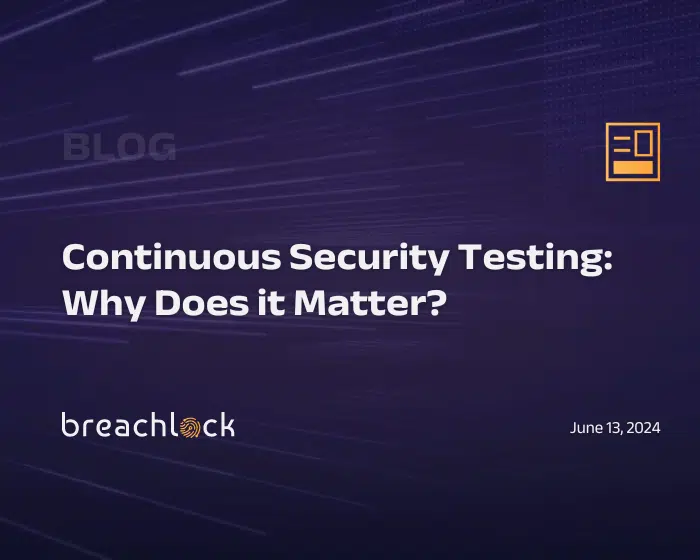

Continuous Security Testing: Why Does it Matter?
The growing complexity and cost of cybersecurity threats are evident, emphasizing the need for organizations to implement robust security measures to effectively mitigate both known and emerging threats. Gartner predicts that in 2024, worldwide spending on security will increase to $215 billion, a 14.3% increase from 20231.
In 2023, there were 72% more data compromises than in 2022, as well as 75% more cloud intrusions2. With new developments in generative AI phishing techniques, social engineering methods, and identity-based attacks, the threat landscape is expected to expand even more in the future.
Continuous security testing plays a critical role in identifying and mitigating risks proactively in complex IT environments up against the evolving threat landscape. This blog explores what continuous security testing is and why it is a critical element of modern cybersecurity programs.
What is Continuous Security Testing?
Continuous security testing is the ongoing process of testing an organization’s IT environment from an adversarial point of view by simulating real-world attacks on a system, network, or application. The goal of continuous security testing is to proactively identify security weaknesses and potential vulnerabilities that could be exploited by cybercriminals to damage or compromise the organization’s assets, data, or people. Security teams can quickly identify the gaps that need to be remediated and harden their defenses before they result in – or fail to prevent – a serious security incident.
Continuous security testing involves continuous vulnerability detection, analysis, remediation, and reporting, which is why security teams often turn to penetration testing, ethical hacking, risk assessments, and security posture assessments as part of their continuous security testing processes. Security audits may also be included in the continuous security testing lifecycle.
Continuous Security Testing vs. Traditional Security Testing
Unlike traditional security testing, continuous security testing is not a “point-in-time” exercise. There’s no distinct window of time for testing, and it is not conducted over fixed intervals. Rather, testing happens continuously (or at least at frequent intervals) with the assessments integrated into the organization’s processes. Also, these tests are performed throughout the operational life of the organization’s assets across the entire IT environment.
Additionally, traditional manual penetration testing or security testing is conducted by certified ethical hackers, while continuous security testing or continuous penetration testing is largely automated and relies on specialized tools to identify and exploit vulnerabilities.
The Benefits of Continuous Security Testing
Small, medium, and large enterprises can all benefit from continuous security testing in many ways, but there are five main reasons why continuous penetration testing specifically is gaining momentum over traditional point-in-time penetration testing:
- Fast and Efficient: Since continuous security testing is highly automated, enterprise security teams can scan complex environments with expansive networks much more efficiently than they can with traditional penetration testing. The benefits of speed and efficiency allow security teams to address vulnerabilities more proactively to prevent breaches more effectively.
- Standardized and Consistent: Continuous security testing can maintain a consistent and standardized approach across multiple security tests. When human pentesters are in the mix with traditional penetration testing, it’s extremely challenging to maintain consistent results with the variables added to the equation. With manual pentesting, there are chances of human error occurring in addition to varying levels of skill brought to the table by human pentesters.
- Scalable: Organizations with expansive, continuously growing environments require the scalability that continuous penetration testing offers. Its ability to adapt to increasingly complex systems and network sizes without requiring additional personnel and resources to manage it is a significant benefit for security teams of any sized organization with limited resources.
- Repeatable Testing: Since continuous security testing or continuous penetration testing is automated, tests can be repeated seamlessly. The repeatability enables organizations to proactively and continuously improve their cybersecurity posture and assess benchmarks and progress, which is even more impactful for enterprises with dynamic digital environments.
- Automated Report Generation: Automated tools used for continuous security testing commonly generate comprehensive reports that provide details about the vulnerabilities identified. Some continuous security testing providers offer reports with POCs as evidence for each vulnerability along with their severity levels and recommended remediation steps. These reports provide valuable insights for cybersecurity teams and decision-makers.
Why Continuous Security Testing is Important
Adversarial Tactics Are Constantly Changing
Continuous security testing is vital for modern organizations due to the ever-evolving nature of cyber threats and the increasing complexity of IT environments. Cyber attackers work relentlessly to find new methods to exploit vulnerabilities, meaning that security measures must adapt to stay resilient against the evolving threat landscape. Continuous security testing ensures that organizations are consistently identifying and addressing new vulnerabilities as they emerge, allowing them to mitigate risks before they can be exploited and maintain a robust security posture despite the constantly changing digital environment.
Complexity and Rapid Evolution of IT Systems and Networks
Enterprise organizations today operate in diverse and hybrid environments that include thousands of assets, including IoT devices, cloud services, applications, servers, and more. The complexity of modern IT environments introduces new vulnerabilities and attack vectors as they grow, making it more challenging for security teams to keep track of and mitigate risk effectively. Continuous security testing provides comprehensive and ongoing assessments of the entire IT landscape to ensure that no risk is overlooked. With continuous security testing, organizations can swiftly identify and remediate security issues to fortify their defenses holistically.
Stringent Regulatory Requirements
Many industries are subject to stringent regulations that mandate regular security assessments and audits. Organizations often rely on continuous security testing to maintain compliance for up-to-date security evaluations and detailed audit trails. Investing in continuous security testing helps organizations avoid legal penalties and fines and upholds their reputations by showing their commitment to protecting sensitive data. This helps earn and maintain the trust of their customers and stakeholders. Continuous security testing ensures that organizations are always prepared for audits and can protect their assets and reputation.
Continuous Security Testing with BreachLock
BreachLock offers human-driven and continuous security testing services tailored to the security requirements of enterprises of all sizes. Utilizing a proprietary framework with NLP-based AI models, BreachLock minimizes human effort in detecting, validating, and identifying security flaws, enabling faster and more efficient testing. Their adherence to industry standards such as MITRE ATT&CK, OWASP, NIST, and OSSTMM is based on extensive pentesting experience and accumulated knowledge of attack paths and Tactics, Techniques, and Procedures (TTPs). With thousands of penetration tests conducted, BreachLock provides enriched contextual insights and proof of concepts related to vulnerabilities. Clients benefit from quick turnaround times, full-stack visibility across various systems and applications, and compliance with standards like SOC 2, PCI DSS, HIPAA, GDPR, and ISO 27001. Continuous monitoring, scanning, and retesting ensure that vulnerabilities are promptly addressed, maintaining robust security over time.
Schedule a free discovery call with our team to see how BreachLock’s continuous security testing solutions can help you proactively and continuously discover, prioritize, and remediate threats.
About BreachLock
BreachLock is a global leader in Continuous Attack Surface Discovery and Penetration Testing. Continuously discover, prioritize, and mitigate exposures with evidence-backed Attack Surface Management, Penetration Testing, and Red Teaming.
Elevate your defense strategy with an attacker’s view that goes beyond common vulnerabilities and exposures. Each risk we uncover is backed by validated evidence. We test your entire attack surface and help you mitigate your next cyber breach before it occurs.
Know your risk. Contact BreachLock today!







